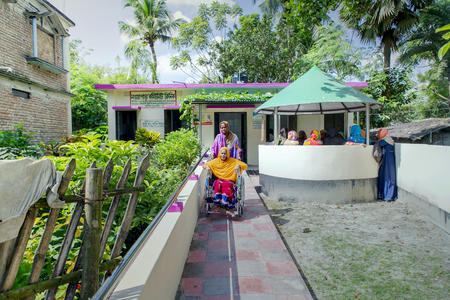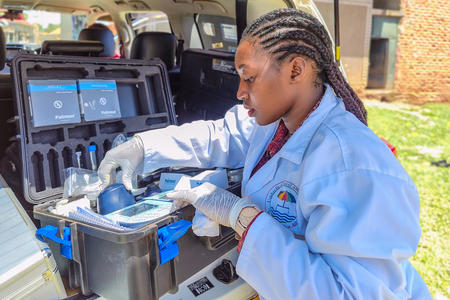Water
Can you imagine life without clean water to drink? For millions of people it's a daily reality.
Every person needs a sustainable supply of clean water: for drinking, washing, cooking, and cleaning. It’s a basic human right.
However, to date, governments, institutions, service providers, and donors around the world haven’t done enough to ensure clean water reaches the poorest and most marginalized people.
In many countries, taps, wells, and pipes delivering clean water simply don’t exist. Even where they do, water supply services are often not affordable or accessible, or aren’t designed to last.
Sanitation
What would life be like without a toilet? Billions of people know only too well.
A decent toilet is something everyone should take for granted – at home, school, work, and in public places. It’s a basic human right that protects people from dangerous diseases and provides dignity.
Governments have neglected sanitation for too long, resulting in a severe lack of finance, skills, resources, and systems to ensure everyone has access to a decent toilet.
Hygiene
Many people are unaware that good hygiene saves life.
Something as simple as handwashing with soap reduces cases of diarrhea. Good hygiene maximizes the benefits of clean water and decent toilets, keeping people healthy for generations to come.
Yet, hygiene promotion schemes, where they exist, often fail to change entrenched practices, such as going to the toilet in open areas outside. They also often don’t address cultural taboos, such as menstrual health and hygiene training for young women. And even when people have the knowledge to make positive changes, they often lack soap or access to washing facilities.
Almost1in10
don't have clean water close to home.
We're collaborating with local partners to find the best solution for getting clean water to everyone, everywhere.
We're collaborating with local partners to find the best solution for getting clean water to everyone, everywhere.
Almost1in5
people don't have a decent toilet.
We're working with partners to help install toilets and train people to maintain them once we are gone.
We're working with partners to help install toilets and train people to maintain them once we are gone.
Almost1in4
lack soap and/or water to wash their hands at home.
Good hygiene promotion is one of the most effective ways to improve global health.
Good hygiene promotion is one of the most effective ways to improve global health.
The Issues
There are many issues that can impact access to water, sanitation, and hygiene - making a bad situation, even worse.
Climate Change
The climate crisis is a water crisis. We need to act now.
Our climate is changing at an alarming rate and it’s making it even harder for the world’s poorest people to get clean water. More frequent and extreme flooding is polluting fragile water sources; longer droughts are drying up springs.
People need a reliable supply of water that keeps pumping through flood, drought and natural disaster. Because with clean water, they can stay disease free, go to school, earn a living and be better prepared for whatever the future brings.
Find out more about how we are adapting and building resilience to climate change
Gender equality
Clean water and decent toilets help transform women's lives, supporting them to fulfil their potential.
Girls often begin collecting water as children and continue to collect and carry water throughout their lives. Women’s needs for safety and privacy are often ignored in the design of water, sanitation, and hygiene services, making it difficult for them to live a life of dignity, to address their needs, and placing them at risk of assault and harassment.
We’re working to achieve gender equality, ensuring women and girls are involved in the planning, roll-out, and ongoing management of services.
Find out more about how we incorporate gender equality into our work
Health
Clean water, decent toilets and good hygiene are the foundations for good health.
When people have access to clean water, a decent toilet, and can practice good hygiene they’re less likely to get sick.
We’re working hard to ensure that the health sector is investing more money in clean water, decent toilets, and good hygiene, and including these essential services in their plans.
Social inclusion
We embrace the principles of equality, non-discrimination and inclusion so everyone can unlock their potential.
Water, sanitation, and hygiene services do not often meet the needs of some of the most marginalized community members. If the construction of water points, toilets, and handwashing facilities does not include accessibility accommodations, differently abled people and elderly people are unable to use them.
We seek to tackle exclusion and marginalization wherever it occurs.
Find out more on how we ensure our programs our socially inclusive
Sustainability
Ensuring services and behaviour change are sustainable is at the core of what we do.
Selecting the right technology is critical. But there also needs to be a strong system in place to turn policies into action, attract finance, and maintain services. Otherwise, there’s a risk that the benefits of clean water and decent toilets stop flowing.
We’re focused on ensuring that water and sanitation services continue to work far into the future.







